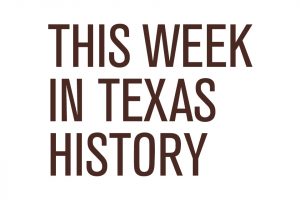On Aug. 9, 1931 Huey P. Long invited the governors of Texas and other southern states to come to New Orleans to discuss his sure-fire cure for what was ailing King Cotton.
From a high of 40 cents a pound at the start of the decade, cotton lost half its value on the world market during the 1920’s. But those were boom times compared to the Great Depression. By the summer of 1931, the South’s money crop had become practically worthless fetching a paltry 5.66 cents per pound.
The Kingfish’s solution, which he borrowed from half-starved constituents in northern Louisiana, was to declare a “cotton holiday” for the coming year. By not producing a single bale in 1932, Dixie could unload its surplus cotton and pump new life into lower-than-a-snake’s-belly prices.
Although only the governors of Arkansas and South Carolina attended Long’s Aug. 21 meeting, the absence of Texan Ross Sterling concerned him the most. Without the Lone Star State, which grew a third of all southern cotton, the “holiday” proposal was destined to die on the vine.
The loyal guests obliged their host by approving a resolution that recommended the complete suspension of cotton production. Amused by the empty gesture, Gov. Sterling announced he had no intention of heeding the hollow call and joked, “It’s Gov. Long’s baby. Let him wash it first.”
“We’ll be glad to wash the baby first,” drawled Huey P., who immediately ordered his rubber-stamp legislature to hurry up with the necessary paperwork. Six days later, Long signed a bill that made cotton planting a crime in the state of Louisiana punishable by a $500 fine and/or 60 days in jail.
Too clever a politician not to leave himself a way out, Long included in the fine print the shrewd stipulation that the moratorium would not take effect until those states responsible for 75 per cent of the cotton crop passed similar laws.
Hopping aboard a chartered airplane, a Long aide went in search of Sterling and finally tracked him down in the Houston airport. Handing the surprised Texan a certified copy of the Louisiana edict, he wisecracked, “Here is Gov. Long’s baby, all washed, powdered and wrapped in a cotton dress.”
This publicity stunt and mass meetings in 75 Texas towns calling for adoption of the Long “holiday” wiped the smile off Sterling’s face. Nevertheless, he still refused to summon the Lone Star legislature into a special session.
Promising to “put the fires under Gov. Sterling again,” Huey chastised his neighbor on Sep. 3 as “a bad interpreter of the real wishes of his people.” The following day, Sterling retorted, “Gov. Long is not running Texas. He may be able to demand that his legislature vote whatever he wants, but we’re a little more democratic in Texas.”
In truth, Sterling had already chosen to capitulate. The very next afternoon, he instructed vacationing legislators to be back at the capital by Sep. 8 to grapple with the cotton crisis.
The Kingfish spoke by radio to an Austin rally of 18,000 cheering cotton farmers on the evening of Sep. 9. An anxious Sterling tried to appeal to the traditional pride of the hostile crowd by asking, “What would Sam Houston think if he would suddenly return to life and see the governor of Louisiana telling the people of his beloved Texas what to do?” The response was a rousing “Hurrah for Long!”
The Kingfish soon went back on the air to denounce Sterling by name and to accuse the governor and his allies of taking cash under the table from “the cotton trust.” He claimed Texas’ elected leaders had “sold the people into slavery.”
The hard-ball tactic backfired. On Sep. 16, 1931, indignant members of the Texas House of Representatives voted down the Long “holiday” plan 92 to 37. Minutes later even angrier senators officially branded the Louisiana governor “a consummate liar” for claiming they had been “bought like a sack of corn.”
“In all the misfortunes of my lifetime, I have never been struck to the heart as I have in the last 24 hours,” lamented Long. “I saw the veil of doom and distress maliciously forced upon two million southern families.”
But from the jaws of defeat, Huey P. Long snatched political stardom. The crusade for the “cotton holiday” transformed him into a national celebrity, a popular folk hero of the down-and-out in the depths of the Depression. Ross Sterling’s own lieutenant governor wrote the Kingfish a fan letter congratulating him for waging a courageous fight on behalf of a just cause.
The real losers were, of course, the southern cotton farmers. In less than a year, thousands were stripped of their land and way of life as the price of cotton fell to 4.6 cents, the lowest in 38 years.
Bartee welcomes your comments and questions at barteehaile@gmail.com or P.O. Box 152, Friendswood, TX 77549 and invites you to visit his web site at barteehaile.com.






